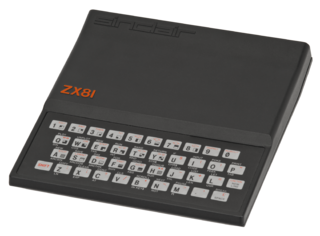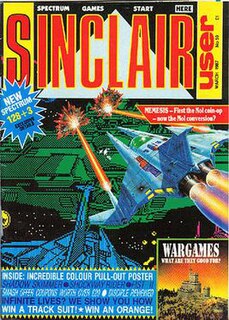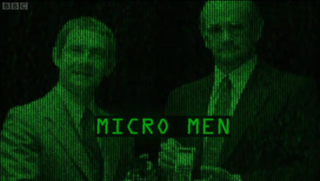
The Jupiter Ace by Jupiter Cantab was a British home computer of the early 1980s. The Ace differed from other microcomputers of the time in that its programming environment used Forth instead of the more popular BASIC.

The Sinclair ZX80 is a home computer launched on 29 January 1980 by Science of Cambridge Ltd.. It is notable for being one of the first computers available in the United Kingdom for less than a hundred pounds. It was available in kit form for £79.95, where purchasers had to assemble and solder it together, and as a ready-built version at £99.95. The ZX80 was very popular straight away, and for some time there was a waiting list of several months for either version of the machine.

The ZX Spectrum is an 8-bit personal home computer released in the United Kingdom in 1982 by Sinclair Research.

The ZX81 is a home computer that was produced by Sinclair Research and manufactured in Dundee, Scotland, by Timex Corporation. It was launched in the United Kingdom in March 1981 as the successor to Sinclair's ZX80 and designed to be a low-cost introduction to home computing for the general public. It was hugely successful; more than 1.5 million units were sold. In the United States it was initially sold as the ZX-81 under license by Timex. Timex later produced its own versions of the ZX81: the Timex Sinclair 1000 and Timex Sinclair 1500. Unauthorized ZX81 clones were produced in several countries.

Sir Clive Marles Sinclair is an English entrepreneur and inventor, most commonly known for his work in consumer electronics in the late 1970s and early 1980s.

The Timex Sinclair 1000 (TS1000) was the first computer produced by Timex Sinclair, a joint venture between Timex Corporation and Sinclair Research. It was launched in July 1982, with a US sales price of US$99.95, making it the cheapest home computer at the time; it was advertised as "the first computer under $100". The computer was aimed at regular home users. Unlike earlier computers aimed at home users, the TS1000 was not a kit which had to be soldered and assembled. As purchased, the TS1000 was fully assembled and ready to be plugged into the users' home TV. The TS1000 was a slightly-modified version of the Sinclair ZX81 with an NTSC RF modulator, designed for use with North American TVs, instead of the UK PAL RF modulator which was used for units sold in Portugal. The TS1000 doubled the onboard RAM from 1 KB to 2 KB. The TS1000's casing had slightly more internal shielding but remained the same as Sinclair's, including the membrane keyboard. It had black-and-white graphics and no sound. It was followed by an improved version, the Timex Sinclair 1500 which had substantially more RAM and a lower price (US$80). However, the TS1500 did not achieve market success, given that the marketplace was by this time dominated by Commodore, RadioShack, Atari and Apple.
A chiclet keyboard or island-style keyboard is a computer keyboard with keys that form an array of small, flat rectangular or lozenge-shaped rubber or plastic keys that look like erasers or "Chiclets", a brand of chewing gum manufactured in the shape of small squares with rounded corners. It is an evolution of the membrane keyboard, using the same principle of a single rubber sheet with individual electrical switches underneath each key, but with the addition of an additional upper layer which provides superior tactile feedback through a buckling mechanism.
Sinclair Research Ltd is a British consumer electronics company founded by Clive Sinclair in Cambridge. It was originally incorporated in 1973 as Westminster Mail Order Ltd, renamed Sinclair Instrument Ltd, then Science of Cambridge Ltd, then Sinclair Computers Ltd, and finally Sinclair Research Ltd. It remained dormant until 1976, when it was activated with the intention of continuing Sinclair's commercial work from his earlier company Sinclair Radionics, and adopted the name Sinclair Research in 1981.

Sinclair User, often abbreviated SU, was a magazine dedicated to the Sinclair Research range of home computers, most specifically the ZX Spectrum. Initially published by ECC Publications, and later EMAP, it was published in the UK between 1982 and 1993, and was the longest running Sinclair-based magazine.

Micronet 800 was an information provider (IP) on Prestel, aimed at the 1980s personal computer market. It was an online magazine that gave subscribers computer related news, reviews, general subject articles and downloadable telesoftware.

1K ZX Chess is a 1982 chess program for the unexpanded Sinclair ZX81.

The ZX Microdrive is a magnetic tape data storage system launched in July 1983 by Sinclair Research for its ZX Spectrum home computer. It was proposed as a cheaper alternative to the floppy disk, but it suffered from poor reliability and lower speed. The Microdrive technology was later also used in the Sinclair QL and ICL One Per Desk personal computers. The minimum storage capacity of a Microdrive tape cartridge was 85 KB.
Gilsoft was a British developer of video games and related utilities. The company was best known for developing the text adventure authoring tool The Quill and its successor, Professional Adventure Writer.
Costa Panayi is a former computer game programmer active during the 1980s. He founded Vortex Software with Paul Canter, publishing games for the ZX Spectrum, Commodore 64 and Amstrad CPC.
The history of the personal computer as a mass-market consumer electronic device began with the microcomputer revolution of the 1970s. A personal computer is one intended for interactive individual use, as opposed to a mainframe computer where the end user's requests are filtered through operating staff, or a time-sharing system in which one large processor is shared by many individuals. After the development of the microprocessor, individual personal computers were low enough in cost that they eventually became affordable consumer goods. Early personal computers – generally called microcomputers – were sold often in electronic kit form and in limited numbers, and were of interest mostly to hobbyists and technicians.

Micro Men, working title Syntax Era is a 2009 one-off BBC drama television programme set in the late 1970s and the early-mid 1980s, about the rise of the British home computer market. It focuses on the rivalry between Sir Clive Sinclair, who developed the ZX Spectrum, and Chris Curry, the man behind the BBC Micro.

Formula One is a Formula One racing management videogame published in 1985 by CRL Group PLC, developed by G.B. Munday and B.P. Wheelhouse for the ZX Spectrum, and converted to Amstrad CPC by Richard Taylor.
Richard Francis Altwasser is a British engineer and inventor, responsible for the hardware design of the ZX Spectrum.
Sinclair Programs was a magazine published in the United Kingdom, initially by ECC Publications of London and subsequently by EMAP. It was dedicated entirely to listings for programs for the Sinclair Research ZX80, ZX81 and ZX Spectrum computers, contributed by readers. The magazine was one of three launched in 1982 by ECC, the other two being Sinclair User and Sinclair Projects, the latter dedicated to hardware projects for the Sinclair computers. The magazine was published between May/June 1982 and September 1985.

Judge Dredd is a platform shoot 'em up video game based on the character of the same name. It was developed by Beam Software and published by Melbourne House. It was released in Europe in 1986, for Commodore 64 and ZX Spectrum.












